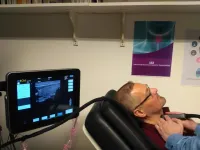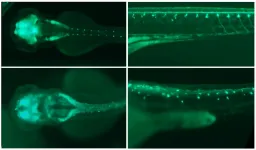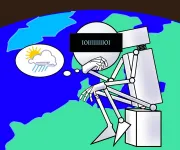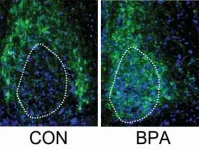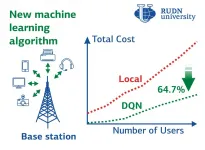(Press-News.org) YouTube is a treasure trove of virtual reality fails: users tripping, colliding into walls and smacking inanimate and animate objects. By investigating these "VR Fails" on YouTube, researchers at the University of Copenhagen have sought to learn more about when and why things go sideways for users and how to improve VR design and experiences so as to avoid accidents.
Millions of YouTube viewers have enjoyed hearty laughs watching others getting hurt using virtual reality - people wearing VR headsets, falling, screaming, crashing into walls and TV sets, or knocking spectators to the floor. Some of us have even been that failing someone. Now, videos of virtual reality mishaps, called "VR Fails", have actually become a field of research.
Specifically, University of Copenhagen researchers who specialize in improving the relationship between computer technology and human beings studied 233 YouTube videos of VR fails. Their results have now been published in END
What could possibly go wrong with virtual reality?
2021-06-01
ELSE PRESS RELEASES FROM THIS DATE:
Hybrid redox-flow battery with a long cycle life
2021-06-01
Redox-flow batteries store electrical energy in chemical compounds that are dissolved in an electrolyte. They are a particularly promising alternative to lithium-ion batteries as stationary energy storage. A team headed by Prof. Dr. Ingo Krossing from the Institute of Inorganic and Analytical Chemistry at the University of Freiburg has succeeded in developing a non-aqueous All-Manganese Flow battery (All-MFB) that uses sustainable manganese as its active material and has a long cycle life. The researchers present the results of their work in the latest edition of Advanced Energy Materials.
Active materials are ...
Artificial intelligence enables smart control and fair sharing of resources in energy communities
2021-06-01
Energy communities will play a key role in building the more decentralised, less carbon intensive, and fairer energy systems of the future. Such communities enable local prosumers (consumers with own generation and storage) to generate, store and trade energy with each other -- using locally owned assets, such as wind turbines, rooftop solar panels and batteries. In turn, this enables the community to use more locally generated renewable generation, and shifts the market power from large utility companies to individual prosumers.
Energy community projects often involve jointly-owned assets such as community-owned wind turbines or shared battery storage. Yet, this raises the question of how these assets should be controlled - often in real time, and how the energy outputs jointly-owned ...
The LUCA device proves its readiness for a better thyroid cancer screening
2021-06-01
Thyroid nodules are a common pathology having a prevalence of 19-76% when screened with ultrasound, with higher frequencies in women. Current medical methods used to assess the malignancy of a nodule consist in performing an ultrasound, followed by a Doppler ultrasound, and then a biopsy. However, unfortunately, these methods present both low specificity and low sensitivity. This insufficient effectiveness in accurately being able to diagnose thyroid tumors leads to many unclear or unnoticed cases as well as many others that undergo unnecessary surgeries (false positives) and increase the cost ...
Gene plays major role in brain development
2021-06-01
When the Augustinian monk Gregor Mendel crossed white-flowering with purple-flowering pea plants in the mid-19th century, he made an interesting discovery: The offspring were all purple. He therefore called this trait dominant, while the white blossom color was recessive. The reason for this phenomenon: In peas, each gene occurs twice. One version comes from the maternal plant and the other from the paternal plant. If a pea has inherited the gene for purple flower color from one parent, but the gene for white flower color from the other, purple wins. Only when two genes for white flowers come together in the offspring plant is it white.
Humans also have genes that are inherited either dominantly or recessively. However, the case is not so clear for the mutations investigated ...
The secret lives of Canada lynx
2021-06-01
Using a Fitbit and a spy mic, scientists have discovered new insight into the behaviour of the elusive Canada lynx. A new study by researchers from McGill University, University of Alberta, and Trent University provides a first look at how miniaturized technology can open the door to remote wildlife monitoring.
"Working on one of the boreal forest's top predators, the Canada lynx, we found that two different technologies, accelerometers and audio recording devices, can be used to remotely monitor the hunting behaviour of predators, even documenting the killing of small prey," says lead author Emily Studd, a Postdoctoral Fellow under the supervision of Murray Humphries at McGill University and Stan Boutin at University ...
Survey shows weak trust in Canadian courts on energy projects, climate policy disputes
2021-06-01
The University of Ottawa's Positive Energy program released new survey results showing that a large segment of the Canadian public does not trust the courts to settle disputes over energy projects or climate policy. The survey was conducted by Positive Energy's official pollster, Nanos Research.
Canadians were asked: On a scale of 0 to 10, where 0 means do not trust at all and 10 means trust completely, how much do you trust the courts to settle disputes over government decisions on energy projects? They were asked the same question for climate policy. The results are very similar. Only one in three Canadians trust the courts to settle disputes over energy projects or climate policy (answering between 7 and 10: 31% for energy, 30% for ...
Trust the machine -- it knows what it is doing
2021-06-01
Machine learning, when used in climate science builds an actual understanding of the climate system, according to a study published in the journal Chaos by Manuel Santos Gutiérrez and Valerio Lucarini, University of Reading, UK, Mickäel Chekroun, the Weizmann Institute, Israel and Michael Ghil, Ecole Normale Supérieure, Paris, France. This means we can trust machine learning and further its applications in climate science, say the authors. The study is part of the European Horizon 2020 TiPES project on tipping points in the Earth system. TiPES is administered from the University of Copenhagen, Denmark.
Man or ...
UCalgary study shows BPA exposure below regulatory levels can impact brain development
2021-06-01
Humans are exposed to a bath of chemicals every day. They are in the beds where we sleep, the cars that we drive and the kitchens we use to feed our families. With thousands of chemicals floating around in our environment, exposure to any number is practically unavoidable. Through the work of researchers like Dr. Deborah Kurrasch, PhD, the implications of many of these chemicals are being thoroughly explored.
"Manufacturers follow standards set by regulatory bodies, it's not up to the manufacturers to prove the chemicals in consumer products are safe," says Kurrasch, a researcher in the University of Calgary's Hotchkiss Brain ...
Right-wing rhetoric and the trivialization of pandemic casualties
2021-06-01
Right-wing voices set out powerful but misleading arguments to justify inaction by the Trump administration during the COVID-19 pandemic, according to a new study of the rhetoric used by high-level government officials and influential commentators in the US during the first half of 2020.
In a study published in the DeGruyter journal Open Anthropological Research, Professor Martha Lincoln of San Francisco State University examined how public officials openly pushed for people to accept widespread illness and death from the virus by adopting a tone that suggested premature death was normal and the scale of death acceptable in the grander ...
RUDN mathematician found a way to boost computations for IoT devices by three times
2021-06-01
RUDN mathematician and his colleagues from China, Egypt, Saudi Arabia, United Kingdom, and Qatar have developed an algorithm allowing the distribution of computing tasks between the IoT devices and the cloud in an optimal way. As a result, the power and time costs are reduced by about three times. The study was published in the Big Data.
With the development of technologies and devices, Internet of Things (IoT) applications require more and more computing power. The amount of data that the IoT devices need to process can be so large that it is reasonable to migrate computing to the cloud. Cloud computing provides flexible data processing and storage capabilities. But Computation offloading, meaning transferring of the resource-intensive processes ...


